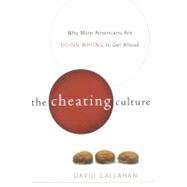
What is included with this book?
| Preface | p. vii |
| "Everybody Does It" | p. 1 |
| Cheating in a Bottom-line Economy | p. 28 |
| Whatever It Takes | p. 63 |
| A Question of Character | p. 98 |
| Temptation Nation | p. 134 |
| Trickle-down Corruption | p. 167 |
| Cheating from the Starting Line | p. 196 |
| Crime and No Punishment | p. 225 |
| Dodging Brazil | p. 259 |
| Sources | p. 297 |
| Endnotes | p. 303 |
| Index | p. 337 |
| Table of Contents provided by Rittenhouse. All Rights Reserved. |
The New copy of this book will include any supplemental materials advertised. Please check the title of the book to determine if it should include any access cards, study guides, lab manuals, CDs, etc.
The Used, Rental and eBook copies of this book are not guaranteed to include any supplemental materials. Typically, only the book itself is included. This is true even if the title states it includes any access cards, study guides, lab manuals, CDs, etc.
Excerpted from The Cheating Culture: Why More Americans Are Doing Wrong to Get Ahead by David Callahan
All rights reserved by the original copyright owners. Excerpts are provided for display purposes only and may not be reproduced, reprinted or distributed without the written permission of the publisher.